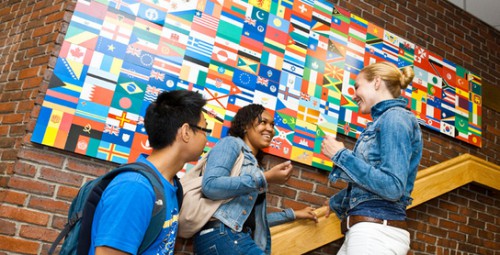With summer quickly approaching, international students on campus have a lot more to think about than the average student from the U.S.
Apartment leases are close to ending and work visa laws are holding back students from earning income. The next question is always whether or not it is economical for a student to pay for an expensive roundtrip flight that can cost up to $2,500, which is what most students expect to earn in a summer.
Although spending time with family is alluring, international students have found themselves on the search for internship opportunities in the area to save themselves from footing the steep bill necessary to travel across continents. For any student, both from the U.S. and abroad, summer internships and jobs are always a hot topic the few weeks before the spring semester closes. Since conventional jobs such as café baristas or waiting tables are often too complicated to come across on account of visa laws, resorting to unpaid internships has been the best and safest bet for international students.
“I want to go back [home], it is not financially reasonable to stay. Can you imagine sitting around for four months?” Dauda Wague, ’14 from Mali, said. “If I was allowed to have a job and work, I would stay.” Wague finds his situation influenced as well by the opportunity to work at home, especially for the experience.
“The longer you are here the more you realize you may want to go back after graduation,” reaffirmed Wague. “Most African students at Suffolk had their views changed. They wanted to come here and work and find experience. But right now, it seems like if you can find a job in Africa, it is better. You feel more at home and your money is more useful.“
This business side of the decision showed itself as particularly attractive. “The market in Africa is still wide open, free from competition. It is so much easier to get into business in Africa,“ said Wague For Wague, living and studying in America has presented the opportunity to study at a first-rate university gaining international recognition, but his long-term intent seems to be working and taking his education back to Mali.
Reema Al-Ashgar, ’16, an electrical engineering student from Riyadh, Saudi Arabia, has been drawn to Suffolk for the summer via educational opportunity, but that does not mean she does not dearly miss her home country.
“I want to take two classes, English and Economy,” Al-Ashgar stated, “and I am planning to talk to my professor to see if he could give me a position to research at MIT. He needs to see passionate engineering students and the department gives the opportunity to three students to do research, but I still don’t know.”
Al-Ashgar still would rather be home and enjoying the family and culture she grew up with. “I want to go back; I miss my family; I haven’t seen them for a whole year.” She is even missing out on community events. “We have our holy month and holiday and I won’t be able to go there and it makes me feel bad,” she said. However, her sister has found the opportunity to go back because the Saudi Embassy pays a round trip ticket for students in the U.S. once each year. Al-Ashgar was more prone to take this trip during Christmas break.
Al-Ashgar commented on the summer sessions which allow students to stay on campus and study without their student visas expiring. “Most people take Summer One and then go back,” Al-Ashgar said, but it can become a hassle when traveling. Other international students have found themselves in a more convenient position for summer opportunities, but the realities with their family and friends do not always prove easy to understand.
Carol Leon, ‘15, a sophomore studying international affairs, is presented with a unique situation that brings perspective to the common conundrum international students are faced with having grown up in Mexico. As a dual citizen of Mexico and the U.S., Leon stated that she has “more opportunities than other international students. Friends of mine are going back because they cannot work here,” Leon said. Her situation was based on the conscious decision not to go back to Mexico because in the U.S. “there are more opportunities to get an internship.”
Leon saw how being a student on campus through the summer opened up potential opportunities. “A friend of mine from the Philippines who works in the undergraduate admissions office as a trustee ambassador said it was easier to stay and work than fly home” because of her job on Suffolk’s campus.
It can be “really stressful,” reiterated Leon, because “my brother was born in Mexico without U.S. citizenship and had to apply for Optional Practice Training (OPT),” which allots a one month period after graduation to find a job and stay in the U.S. for up to a year. OPT is a common theme among international students who wish to stay longer in the U.S. rather than immediately traveling and committing to a life in their home countries.
International students make up a great deal of the student population and their presence is welcomed and very much appreciated. The international diversity on campus is what sets Suffolk University apart from so many other institutions in the U.S. Unfortunately, their enrollment does not come without financial and family difficulties when making a decision to stay or go home over break. International students strive for better opportunities such as internships and work-study positions, but there are more factors for these students to consider that effect their future work and life possibilities.






